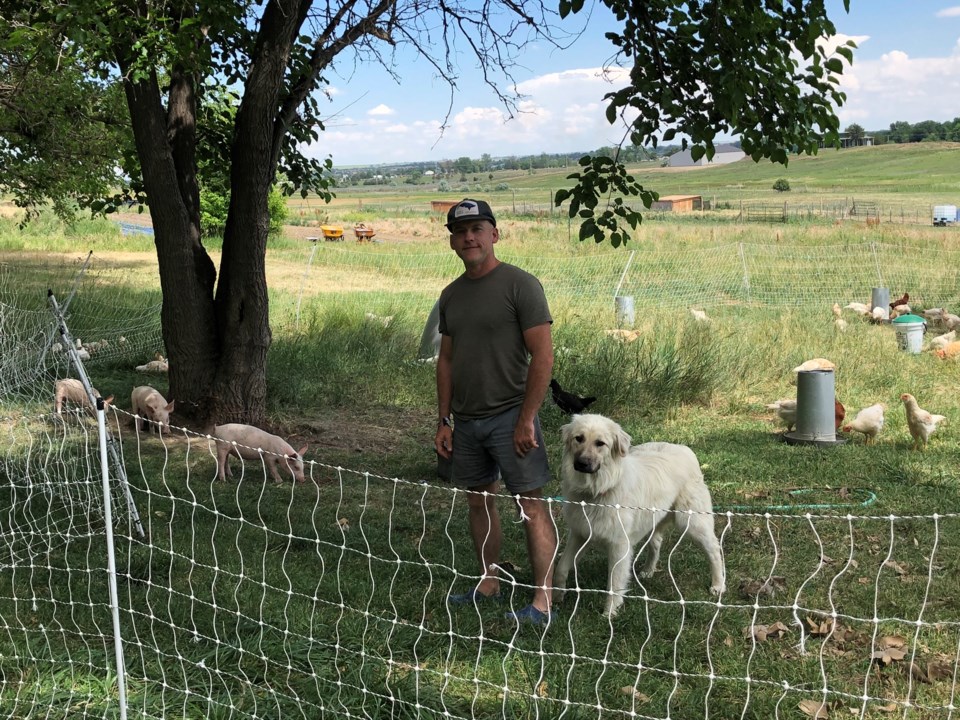Just west of Longmont proper lies McCauley Farms owned by Marcus McCauley. Here McCauley is living his dream to heal people and the planet through food.
McCauley grew up in Oklahoma, where he learned his passion for the land from his parents and grandparents. Out of necessity, he turned to regenerative farming when he moved to the farm outside Longmont eight years ago. The need came because land in Colorado is slowly turning into a desert, McCauley said.
Regenerative agriculture is an environmentally conscious way of farming: “We are trying to build a functioning farm ecology. You don’t see waste in ecosystems. The output of one part of the ecology is the input for another. We are using the wisdom of nature in how we build our farm system,” McCauley said.
The farming technique is bringing “the soil back to life,” he said. “If we want to be ecologically and environmentally sustainable for generations to come then we needed to be regenerative.”
Picaflor, a pepper flake seasoning created on McCauley Farms, is one of the ways he has used his skills to continue his zero-waste farming. After trying to sell peppers, McCauley had “lots of cosmetic ones leftover.” His first thought was to preserve them through fermentation. The process took off beyond McCauley’s expectations. He then wanted to use the byproduct of the process to create something good.
McCauley and his team screened out the skins and stems, feeding those to the chickens, and dehydrated the rest. It created pepper flakes that were then packaged and sold at markets including Whole Foods and Natural Grocers in 12 states, McCauley said.
Picaflor is “alchemy” for pizza McCauley said, but it also can be used as a seasoning or in soups.
Fermenting the peppers went beyond avoiding waste. McCauley, a chef himself, wanted to show other farmers there were other things they could do with their produce besides selling it at farmers’ markets. Also, “I get to scratch my culinary itch by making these products,” he said.
McCauley is participating in the Ollin Farms Virtual Farmstand, where he sells pickles.
COVID-19 has hit every industry and McCauley said he is grateful for support he’s received through community supported agricultural programs, or CSAs, as well as to other farms and grocery stores that carry his farm’s products.
“There has been a huge surge of support from the local community. There has been a huge outreach of existing and new customers, people who want to support the farm and who also want to secure a supply of food,” McCauley said.
As people return to buying their food directly from farmers, McCauley is urging them to be thoughtful about their choices.
“I think that people should consider where their food comes from. It’s a wonderful journey to start to ask that question and find out. Along that journey you get to meet some really great people that are right down the road from them,” McCauley said.
Boulder County, through its Office of Sustainability, Climate Action & Resilience, also encourages “the preservation and sustainable use of agricultural lands as a current and renewable source of food and feed and for their contribution to cultural, environmental and economic diversity.”
It also promotes “sustainable agricultural practices on publicly owned lands” and encourages them on private lands. “Sustainable practices include production methods that are healthy, have low environmental impact, respectful to workers, are humane to animals, provide profitable agriculture opportunities to farmers and support farming communities.”
The county also sets aside $305,000 generated by a 2016 voter-approved tax initiative for grants for sustainability-focused initiatives that “address the priority needs of local farmers and agriculture producers.” The ballot measure allocated a portion of sales and use tax revenue to fund countywide sustainability infrastructure and programs. The application period for 2020 grants closed in January.


